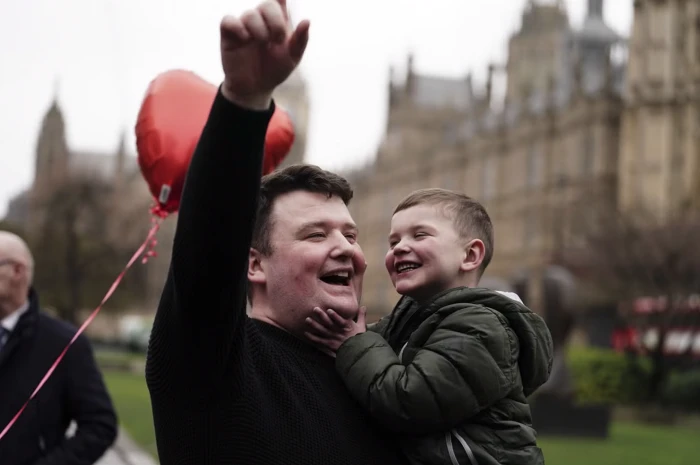

Changing the law isn’t easy. Changing it in on the hill of Stormont, when government isn’t even up and running, is something else entirely.
Over the last few years, I’ve been part of the Donate4Dáithí campaign. It started because my son, Dáithí, was born with a serious heart condition. He’s been waiting on a heart transplant since 2018. I wanted to raise awareness about organ donation, but that quickly grew into a much bigger movement: one that would help change the law.
This week marks two anniversaries: seven years since Dáithí joined the waiting list, and two years since Dáithí's Law came into effect. It introduced a soft opt-out organ donation system in Northern Ireland. That means adults are now considered potential organ donors unless they choose to opt out. It brought us in line with the rest of the UK, and the south of Ireland have also followed suit. But it nearly didn’t happen.
The campaign built strong public support. After years of lobbying and building relationships, the campaign finally had the backing of every major political party. The legislation was ready to go. Then Stormont collapsed, and secondary legislation could not be passed to finalise Dáithí’s Law.
A campaign built around lobbying our MLAs, and suddenly I felt like I had no one to lobby. There was a feeling in the air that the job was done, and then I was told that we’d have to wait. That it couldn’t be done. That nothing could move forward without a functioning Assembly. But I didn’t accept that and started engaging with any politician that would listen. Stormont was recalled discussing a return of the Assembly, on Valentine’s Day (which also happens to be Congenital Heart Defect awareness day). What a romantic story that would have been, but again it wasn’t to be.
I could then turn my attention to the Secretary of State Chris Heaton-Harris and the Northern Ireland Office. I pointed to other campaigns that had used Westminster routes. I showed how this was about saving lives, not scoring political points. I used one of the most powerful tools that I had, and that was the power of storytelling. Believe it or not, politicians are human, and I can only imagine that many of them started on their journey to make a difference.
Eventually, I got there. Dáithí’s Law was passed at Westminster with the support of every major party, and an extraordinary intervention by the British government. For me, it was a moment that proved what grassroots campaigning can achieve. It was a moment that proved love, a personal story and determination can push policy over the line.
But it also taught me a lot about the system.
Here are a few things I’ve learned along the way.
Things take time
Too much time.
You can put your heart and soul into something, get people excited, feel like the momentum is sky high – then wait two months for a reply. And that reply might just be to schedule a meeting another two months away.
By then, the energy can be gone. Society will probably have moved on. And you’re left trying to build it all up again.
Sometimes I wonder if it if it is because of how busy modern life is. Other times, I wonder if the system is designed that way – to wear people down until they give up. Thankfully, we didn’t give up.
Expect the knockbacks
One of the hardest lessons for me? Realising that even if you have a strong case, you might still get a no. Or worse: silence.
I used to think if I explained things clearly enough, showed the evidence, brought in the lived experience – that it had to lead to progress.
But that’s not how it works. I had to learn to manage my own expectations. That became the first thing I told anyone coming to me for advice: manage your expectations first, then work from there.
If you expect a breakthrough every time, you’ll end up burnt out and heartbroken. But that doesn’t mean you shouldn’t aim for the stars. When I started managing my expectations, I felt that the victories, no matter how great or small, were even sweeter. And when I got that knock back, I could push on and keep knocking.
Relationships matter
Over time, I built good relationships across all parties. Even when Stormont wasn’t sitting, I felt like I had access to decision-makers.
Impartiality mattered and I never made it party political. I kept the focus on organ donation, on saving lives, and on Dáithí. That helped build trust and got people working together who wouldn’t normally share a platform.
People connect with people. And a personal story often lands harder than a policy paper ever could.
Keep showing up
We showed up everywhere: TV, radio, schools, public events, conferences. I shared our story. I kept it visible. I brought emotion and honesty into the public space, and I made it harder for people in power to look away.
There were times it was exhausting. Times it felt like no one was listening. But I kept going.
And slowly, the system started to shift. This shift led to public outrage, and to be honest – I even felt that members of the media were outraged on our behalf. They had been on the journey with us for years before then. The importance of media relations, and I do believe that because I showed up everywhere for them to share the story, that political correspondents from all major media outlets here, put their shoulder to the wheel for Dáithí’s Law, when it mattered most.
Wins take a village
I didn’t do this alone. It took other campaigners, charities, civil servants, politicians, journalists, and ordinary people backing us up.
I worked alongside the British Heart Foundation. I had support from transplant teams and NHS staff. I had academics backing up our case with data. And I had our community, always pushing us forward.
It was a collective effort. And that matters. Because real change usually isn’t about one voice. It’s about many voices, moving in the same direction. But one thing it take, was leadership and I am proud to have led such an amazing campaign.
What needs to change?
The way government departments and politicians respond to campaigners needs to improve.
People deserve timely responses. Even just an acknowledgement.
Campaigners shouldn't have to chase for months to find out if a meeting is happening. A more responsive, transparent process would help keep momentum going and stop campaigns falling apart in the gaps.
There should also be clearer access points for campaigners from outside formal politics. Community voices shouldn’t need to learn the system from scratch every time they want to make a difference.
Final thought
Getting Dáithí’s Law over the line took years. And while I’m incredibly proud of that achievement, I know the work isn’t finished.
We still need to keep the conversation going on organ donation. I still need to make sure the law leads to real change on the ground. And I still need to make space for other voices, other families, and other stories.
But if this experience has taught me anything, it’s this:
Don’t give up. Even when the doors feel closed. If there is no current path to your end goal, then create or carve that path, no matter how long it takes.
Máirtín Mac Gabhann is a campaigner and dad from West Belfast, best known for leading the Donate4Dáithí campaign, named after his son who has been waiting for a heart transplant since 2018. Through public work, lobbying, and powerful storytelling, Máirtín helped change organ donation law in Northern Ireland, now known as Dáithí’s Law.
He’s passionate about making real change for families like his and is now focused on building a broader political and community movement around organ donation, healthcare rights, education and equality. Máirtín continues to work with charities, politicians, and grassroots groups to keep the conversation going. Máirtín’s work is shaped by lived experience, always aiming to make a difference for others facing similar challenges
Pivotal Platform is a home for guest writers to contribute their perspectives on public policy debates in Northern Ireland. The views expressed by guest writers are not necessarily those of Pivotal.





